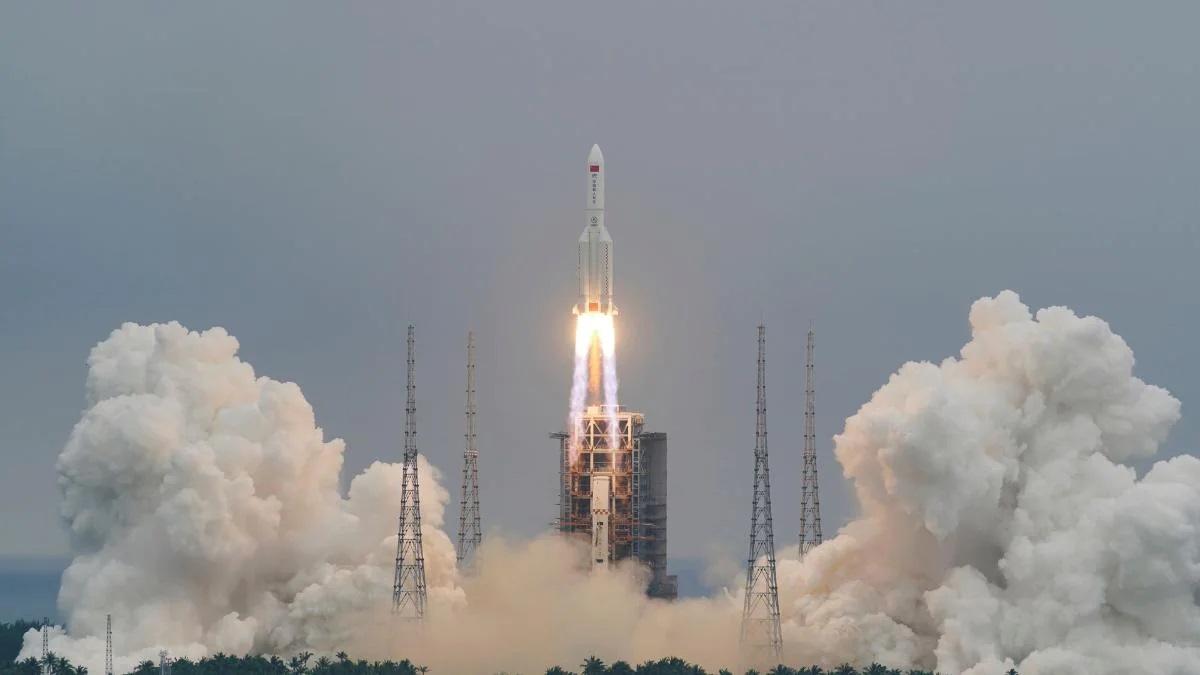
Chinese Rocket Debris Striking Back To earth, Diving Right into the Indian Ocean
Officials said the Most of the Long March 5 B burned up in the air, but Nasa was critical of China’s lack of transparency within the re-entry. The Majority of the rocket was destroyed as it re-entered the atmosphere, but state media reported the debris landed only west of the Maldives on Sunday.
Chinese State Pressing
According to the Chinese state press, the Annals of China’s most giant rocket have plummeted straight back to Earth, diving to the Indian Ocean near the Maldives. Thus, according to the Chinese state press, ending days of speculation over where the debris will hit.
Parts of the 30-meter center of the Long March 5B rocket re-entered the air at 10.24 am Beijing time (2.24’m GMT) and landed at a spot together with the temptations of longitude 72.47 degrees east and latitude 2.65 degrees northwest, state media cited any office saying.
McDowell, an associate of their Harvard-Smithsonian Center for Astrophysics. Said “it creates the Chinese rocket designers look lazy which they didn’t deal with that,” .
“It is clear that China is a failure to meet responsible standards about their distance debris,” said Nasa secretary Bill Nelson, a former senator, and astronaut who had been picked for that role in March.
“It’s essential the China and most of space-faring nations and business entities behave responsibly and transparently in the distance to make sure the safety, stability, security, and long-term sustainability of outer space activities.”
US Space Confirmed Report
The US Space control confirmed the re-entry into the atmosphere of this rocket over the Arabian peninsula. However, it said it was not known if the debris had struck water or land. “The exact location of this impact and the span of debris, both of which are unknown at this time, won’t be released by US Space Command,” it said in an announcement.
Space watchers across the globe have been anticipating the introduction of the Long March 5 B distance rocket as it began to drop altitude a week amid concerns that it was out of control. It is one of the most significant pieces of space debris to go back to Earth and motivated the White House to call for “responsible space behaviors.” In addition, China’s failure to issue strong safety reassurances from the run-up to the re-entry fuelled anxiety.
“It is common practice around the globe for upper stages of rockets to burn up while re-entering the air,” explained Wang Wenbin, a spokesman at the Chinese foreign ministry, even in a regular media briefing on Friday.
“In my knowledge, the upper stage of this rocket was deactivated, so that most of its parts will probably burn up upon re-entry, making the likelihood of damage to airborne or ground structures and activities shallow,” Wang said at that time.
Design Of Rocket
The Long March 5 B — comprising one core point and four boosters — raised off from China’s Hainan island on April 29 using the un-manned Tianhe module that contains what’s going to become living quarters permanent Chinese space channel. The rocket is set to be followed by ten more missions to finish the station.
“The Long March 5 B re-entry is odd because, during launching, the very first stage of the aircraft reached orbital speed rather than falling scope as is usual practice,” the Aerospace Corporation said in a post.
The open center stage was losing elevation for the past week. Also, pros estimated its dry bulk to be around 18 to 22 tonnes.
Extended March 5 rockets are critical to China’s suburban distance ambitions — from the delivery of modules and crew of its projected space station to launches of exploratory probes to the moon and also Mars. The Long March launched a week ago has been the subsequent deployment of the 5B version since its maiden flight in May this past year.
In May 2020, bits from the first Long March 5 B dropped on Ivory Coast, damaging several buildings. No harm was reported.
Debris from Chinese launches is not uncommon within China. For example, in late April, police in the town of Shiyan, Hubei Province, issued a note to people in the neighboring continent to prepare for evacuation as parts were likely to property in the area.








